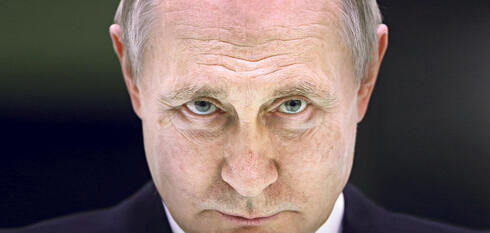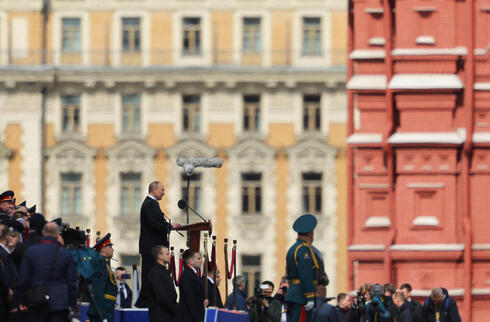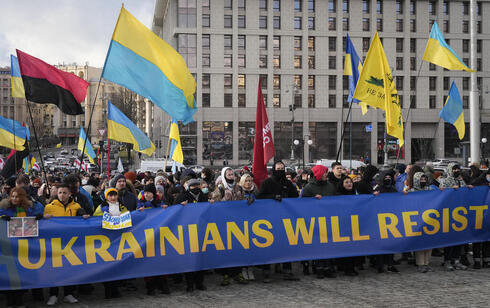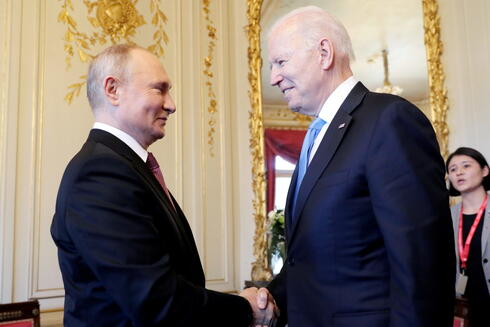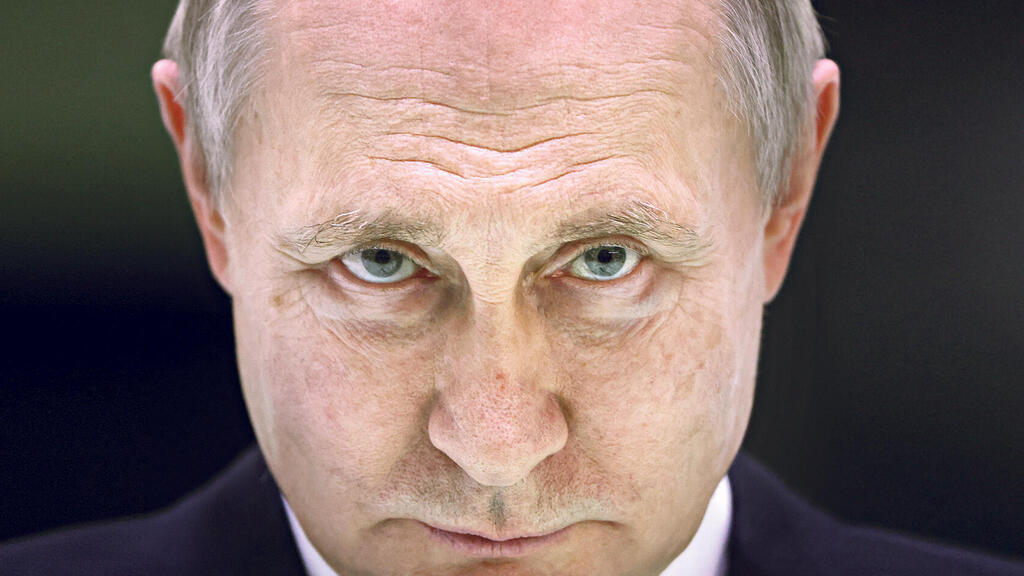
"Israel was just another tool for Putin, and now his true face is revealed"
Like with Hamas, Israel was also deeply wrong about Vladimir Putin. Russia experts explain why the Russian President sided with Hamas, his KGB-shaped worldview, his alliance with Iran, and desire to rival the US
At the end of October, Paris police opened an investigation after antisemitic graffiti was sprayed on buildings with Jewish residents. The police believed it to be a hate crime until they arrested two Moldovan citizens, who quickly confessed and revealed that they had been sent by a Russian agent. Why would a Russian agent instruct foreigners to spray antisemitic graffiti on Jewish homes in France? To answer this, one must understand the modus operandi of Russian President Vladimir Putin.
Behind most of Putin's moves lies a desire to disrupt world order, to restore Russia to what he sees as its rightful status, and Hamas’ attack on October 7 is just another opportunity to do so. So far, Putin has refrained from condemning the attack, senior members of his government hosted a delegation of Hamas leaders in Moscow, and he even drew parallels between the siege imposed by Israel on the Gaza Strip and the one imposed by Nazi Germany on Leningrad, which resulted in the death of a million people.
After hundreds of people stormed an airport in Dagestan’s capital of Makhachkala last month in search of Jewish passengers on a flight landing from Israel, Putin blamed Ukraine and the United States for the local unrest. He then expressed sorrow for the suffering of Palestinian children, women, and elderly in Gaza but did not address Hamas’ attack on Israel.
These incidents clarify that the perception that Hamas was not interested in a military confrontation was as misguided as the belief that Putin would not stand against Israel when needed. This misperception was one of the reasons that Israel was the only Western country that did not meaningfully support Ukraine after the Russian invasion, refused to condemn Russian war crimes, and did not join in Western sanctions imposed on Russia.
How did Putin go from granting Netanyahu an achievement in returning Naama Issachar to Israel during the election period and coordinating with Israel regarding attack targets in Syria, to clearly supporting Hamas? How does the same Russian leader who was among the first to call U.S. President George W. Bush to voice support following 9/11, now stand alongside terrorists who committed unforgivable crimes against Jews, despite all experts agreeing that he is not antisemitic?
Related articles:
An agent of chaos
"Over the years, the relationship between Putin and Netanyahu has been good because, from Putin's perspective, Netanyahu is similar to him," says B., a Moscow-based journalist who wishes to remain anonymous for fear of being accused of being a foreign agent. "For the same reason, the relationship between Putin and Erdogan is also good. Putin sees in both leaders many of his own qualities: strong leaders who have been in power for many years and are often isolated due to their prolonged rule." Another similarity between the leaders is that Putin's first term in office is unlike those that followed. Netanyahu's premiership can also be divided before and after 2015 when he became focused on taking over the media and other centers of power to preserve his own."
B. avoids saying Putin's full name and refers to him as VVP (the initials of Vladimir Vladimirovich Putin) or PU, fearing that the conversation may be monitored. "You can’t generalize discussing Putin because everything with him is personal and specific," she says, "but in general, the characteristic that most defines him is that he is an agent of chaos — the more chaos there is in the world, the more he believes he will benefit. Historically, this was also the method of the KGB."
A contemporary example of sowing chaos comes these days from the border between Russia and Finland. Six months after Finland joined NATO to the dismay of Russia, hundreds of undocumented refugees have arrived every week from Iraq, Yemen and Syria at open border crossings between the two countries. Finland believes that Russia is sending them as retaliation for expanding its cooperation with the West, while Russia accuses Finland of hypocrisy. The result is that Finland recently closed several border crossings between the countries, creating a new point of friction, to Putin's delight.
"Putin enjoys seeing the large protests sweeping through the capitals of Europe and the United States today, and what is happening in American universities," continues B. "Ironically, Russia now appears to be the safest place for Jews because, due to the draconian laws that allow prolonged imprisonment for those who participate in protests, there are no protests at all — not against Israel and not in favor of it."
About 300,000 Jews live in Russia, and according to recent surveys, the level of anti-Semitism in the population is not high and decreases with age. According to a survey conducted at the end of October by the Russian-based Levada Center, two-thirds of respondents have not taken any side in the current war in Gaza, 20% support the Palestinians (the survey did not distinguish between all Palestinians and Hamas), and 6% support Israel.
A double game
"No one should be surprised by the change in Putin's behavior," says Arkady Mil-Man, Head of the Russia Program at the Institute for National Security Studies (INSS) and former Israeli ambassador to Russia. "He has the classic KGB mindset - this is the place that shaped his personality. He sees the world completely differently from us." Mil-Man, who was one of the founders of the Israeli embassy in Moscow on the eve of the establishment of official relations between the countries and served as Israel’s ambassador to Russia in 1993-1995 and in 2002-2006, is likely one of the Israelis with the most experience with Putin. The two have met many times, and at the beginning of his tenure in the Kremlin, Putin gave Mil-Man preferential treatment and spoke with him more than ambassadors of other countries.
"Putin is not antisemitic," continues Mil-Man, "and precisely because of that, he saw Israel as another tool in his chest. There was a time when he said that Israel's security was important because a million former Russian citizens live here. He doesn’t say that anymore. Whoever thinks Putin has a warm place in his heart for Israel is mistaken - Putin sees only how Israel serves his interests, and now that the world has divided again between East and West and he identifies Israel with the West, his true face is revealed."
Yuli Dubov, a Russian writer and scientist who has been living in London for many years due to persecution by Putin, also believes that the Russian president played a double game over the years and sided with Hamas due to Russia’s dependence on Iran. "Until October 7, it was convenient for Putin to sit on both sides - to be a friend of Netanyahu's and support Israel, and also to have good relations with Hamas," he says. "This allowed him to influence both sides. But the game was over and he had to choose a side. Since the war in Ukraine, Russia developed a new dependence on Iran, and Putin had to choose this side.
"When the war in Gaza ends, he will realize what he has done and may try to switch sides again. In the meantime, he will continue to supply weapons to both Hamas and Hezbollah, but also offer to mediate a deal to release the hostages. Israel also can’t take both sides for long regarding the war between Russia and Ukraine. It is possible for a short time, but in the long run, it becomes very uncomfortable."
Dubov knows Putin well as the right-hand man of Boris Berezovsky, an oligarch and senior Russian government official who fled to London due to a conflict with Putin where he was found dead in 2013. Like Mil-Man, who says that Putin has "undergone a complete metamorphosis since 2002," Dubov believes that Putin today is not the same Putin of twenty years ago. "As Putin continued to rule, his sense of self-importance grew. Prolonged power turns a person into a monster, and that's what happened. He wasn’t always a monster, just a regular KGB officer - perhaps not the most honest, but not a monster." Dubov points out that he knows the person behind the Telegram channel insisting that Putin is dead and that there is a stand-in pretending to be Putin on TV, emphasizing that this is an absolute lie.
A superpower in name only
Putin was born in 1952 in Leningrad (now Saint Petersburg) to a working-class family, after two of his older siblings died in infancy. In 1975, he graduated from law school at Leningrad State University and shortly after enlisted in the KGB, which he later said was a childhood dream. In 1985, he fulfilled another dream when he was sent to Dresden in Germany, the site of German submission to the Allies in 1945, where he received a medal of distinction for cooperation with the German Stasi. With the collapse of the Soviet Union Putin returned to Leningrad, just before it was renamed Saint Petersburg.
In 1991, Putin became an advisor to the mayor of Saint Petersburg, Anatoly Sobchak, the first democratically elected Russian mayor and who led a liberal agenda. After Sobchak lost the mayoral election, Putin moved to Moscow, completed his master’s degree in economics, and joined the party of then-President Boris Yeltsin, who was losing power. In 1998, Putin was appointed head of the FSB, which was essentially a reincarnation of the KGB. In 1999, Putin was appointed prime minister, a then ceremonial and abstract position. Thus, unintentionally, the leader who would dominate Russia for over twenty years began to emerge.
"In hindsight, you can see that from the beginning, what interested Putin regarding the Soviet Union's dissolution was not building a new Russia but mainly money and power. Although he studied law at the university, the culture in which he grew up in Leningrad is closer to the codes of the mafia," says Mil-Man. Putin is estimated to hold assets worth $200 billion, hidden in various places around the world, including with oligarchs whose fortune is considered to belong to the Russian president.
"At first, everyone around Putin thought he was harmless, that he could continue connecting to the West on one hand and, on the other, build a system in Russia that superficially resembles democracy, but isn’t really," explains Mil-Man. "In 2004, then NATO Secretary-General Anders Fogh Rasmussen visited Russia, and what Putin said to him would be incomprehensible today: 'I hope that the expansion of NATO will contribute to security in Europe'."
In 2007, Putin spoke at the Munich Security Conference, delivering his first anti-American speech, where he began to talk for the first time about a unipolar world in which the United States dominates and Russia doesn’t have enough prominence. According to Mil-Man, Putin claimed then that the United States had overstepped its bounds and thought it could run the world alone. There are echoes of this argument in Putin's first reference to October 7, in which he hardly mentioned Israel directly and claimed that the attack was a result of America’s poor Middle East policy.
Since his 2007 speech, one could see Putin's new style of leadership which includes the suppression of independent media, infringement of individual rights, and assassination of political opponents. One of the most prominent opposition figures was Boris Nemtsov, the former Deputy Prime Minister under President Boris Yeltsin, who became one of Putin's most vocal critics and was assassinated in 2015. Just a year prior, in 2014, Russia annexed the Crimean Peninsula, which was criticized by the international community, though no significant action was taken to prevent the annexation.
Mil-Man also explains Putin's decision to go to war in Ukraine in terms of his dictatorial style of rule, rather than to prevent Ukraine from joining NATO — something that was not on the agenda at the time. "My interpretation of the invasion is much simpler," he says. "Ukraine bothers Putin because Ukrainians twice overthrew the regime built there in his image, both in 2004 and in 2014. Ukraine's desire to change the regime and become a democracy was illegitimate in his eyes.
"Over the years, Putin thought that Russia would rule the world alongside the United States as another superpower, but that didn’t happen because Russia is a superpower in name only," asserts Mil-Man. "Economically, it contributes a fraction in global trade, and since the invasion of Ukraine, it became clear that Russia is also not a military superpower, and all that defines it as such is that it has nuclear weapons." In GDP Russia is ranked in the top ten in the world, but in GDP per capita, it lags at 76th place. Before the invasion of Ukraine, the Russian army was considered one of the strongest in the world, but in almost two years Russia is far from achieving its goals and has lost tens of thousands of soldiers.
An alliance of outcasts
Today, Ukraine stands at the center of Putin's policy, dictating his moves, including in relation to Israel and its war with Hamas. In fact, it seems that a regional war in the Middle East is the best news that the Russian president could hope for. As long as the world is focused on Gaza, he can quietly operate in Ukraine without much scrutiny. Additionally, since the United States began providing additional military assistance to Israel, Russia hopes that the Republican party, which has already been reluctant to aid Ukraine, will try to reallocate resources to Israel.
President Biden’s strong stance following the Hamas attack and the deployment of American aircraft carriers in the Mediterranean and the Arabian Sea to deter Iran and Hezbollah surprised the world, including Putin. However, by doing so, the U.S. drew clear battle lines - if the U.S. positions its full military strength, resources, and influence behind Israel, then Russia must be on the other side.
This perception is strengthened by the rapprochement that has taken place in the last two years between Iran and Russia in a pact of alliance of outcasts. The two sanctioned countries have become strategic allies, and, unlike in the past when Russia held the clear hand, Russia is now dependent on Iran to supply them with modern weapons. Furthermore, both Russia and Iran have a common interest in escalating tensions in the Middle East and ensuring that the region remains volatile in order to drive up oil prices. Meanwhile, oil prices remain low compared to the expected $150 per barrel in the event of escalation.
What will Putin do now? Mil-Man, Dubov, and most Russia experts believe that Putin won’t directly intervene in Israel’s war with Hamas and will settle for talks. It is in his interest for the war to last as long as possible, allowing him to throw in an occasional match to spark chaos, and signaling to China to reconsider annexing Taiwan. They believe that Putin is not interested in a third world war because he knows that Russia is not a match for NATO forces. However, the time crunch is working in his favor in another important arena according to latest polls - the potential return of his longtime buddy Donald Trump to the White House, whose idea of world order is the stuff of Putin’s dreams.
